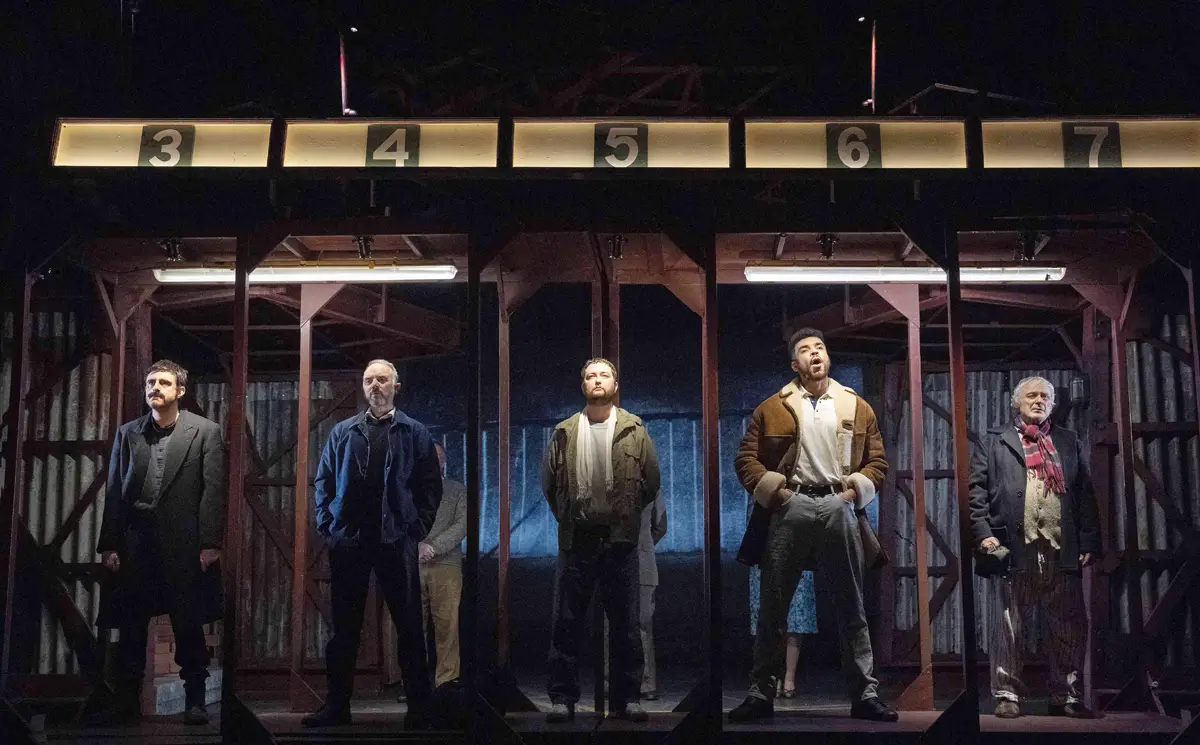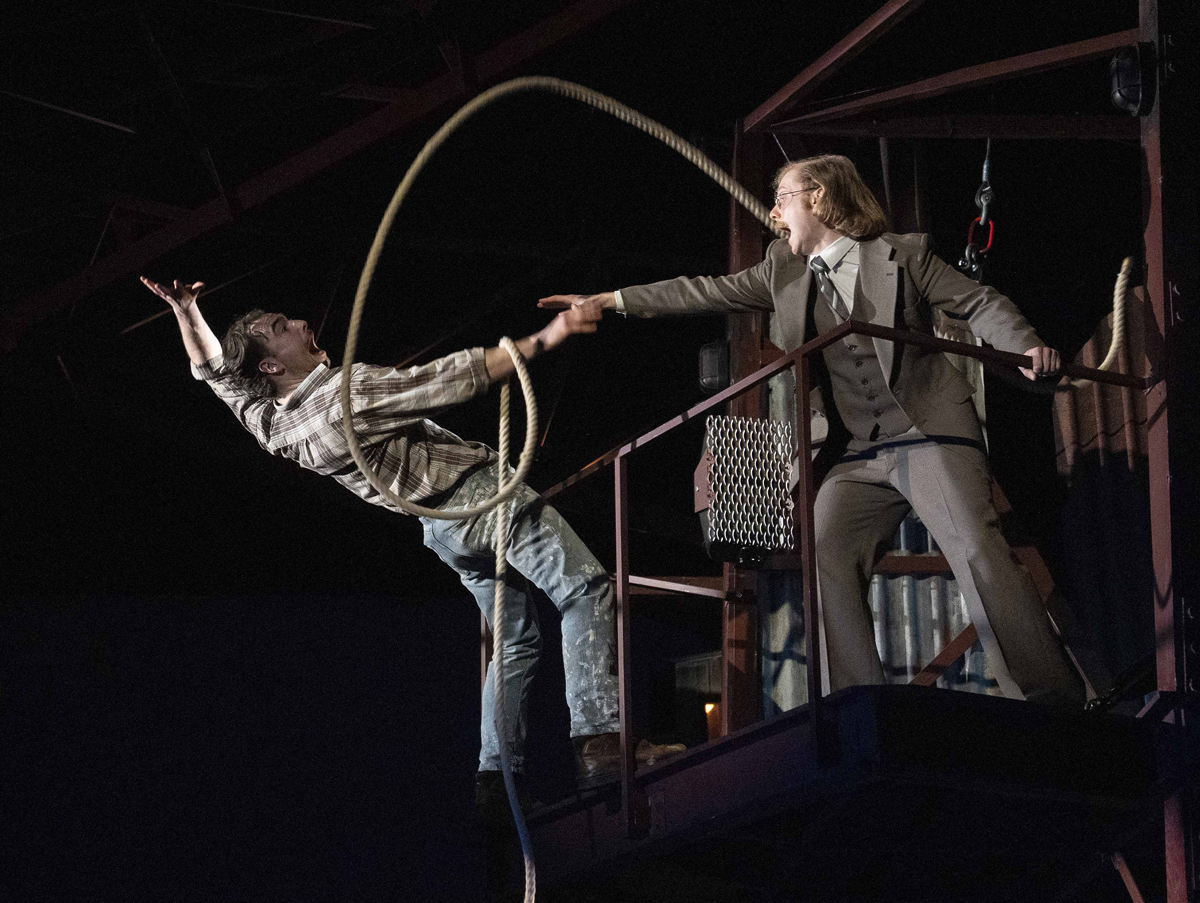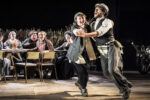Alan Bleasdale’s Boys from the Blackstuff – Review – Leeds Grand Theatre

By Nigel Armitage, May 2025
Direct from the West End and now on a major UK tour, the Liverpool’s Royal Court and National Theatre production of Alan Bleasdale’s Boys from the Blackstuff has arrived this week at Leeds Grand Theatre. Treated to an opening night performance rich in pathos, tarmac-black humour, and downright humanity, as part of a deeply appreciative audience, I was simply blown away by this play, which must qualify as a modern great by anyone’s exacting standards. Playwright James Graham (writer of TV’s Sherwood, Quiz and Brexit: An Uncivil War), director Kate Wasserberg (previous credits include Barnbow Canaries in 2016 at West Yorkshire Playhouse), and everyone involved in this stunning production deserve all the prizes that must surely follow.
It is the case, of course, that the source material for this play is not without its own glittering reputation and renown. In fact, in the landscape of great telly over the last 40-odd years, a small number of programmes stand like Easter Island godhead megaliths and Boys from the Blackstuff is one such programme. Seismic and searing in its era-defining influence, Bleasdale’s 1982 BBC drama series, charting the crushing impact of an economic recession on the lives of a group of working-class Liverpudlians, set new TV reference points for bleakness and poignancy.
The challenge for a new theatre adaptation of such TV majesty is less about ensuring the ‘relevance’ of the early 1980s setting for a modern audience – severe economic hardship and social deprivation sadly remaining prevalent today as then – than on conveying authentically the tragic human cost of a political ideology that viewed the people affected as so much collateral damage. As with the TV series, we must be made to care about the blighted lives of these characters and what they experience.
“Deeply moving”
Fortunately, it is a challenge that this production not only meets but thrillingly surpasses, plumbing emotional depths that are of the play’s own making rather than simply echoes of the TV series. We don’t just care about these characters on stage, we’re invested in them and empathise totally with all they go through in their daily struggle to put food on the table and to maintain a modicum of self-respect. In the prevailing dire economic reality in early 1980s Liverpool, the struggle is despairing and unrelenting.
Without exception, the performances by the cast are spellbinding. Playing headbutting Yosser ‘gizza’ job’ Hughes, Jay Johnson exhilaratingly embodies the character’s complex qualities of male aggression and fragility. He is violent and desperate but achingly cut to the core when his inner fear and vulnerability is exposed by a young female student. George Caple, playing Chrissie, conveys wonderfully the dilemma of a character torn between his hard-worn principles and the urgent need to provide for his family. “Go tell it to the bare cupboards, Chrissie. Tell it to the empty fridge!” As howled by Angie, Chrissie’s exasperated wife, played to devastating effect by Amber Blease.
At the heart of the story is former docker from Liverpool’s storied shipping past George Malone – an outstanding and deeply moving performance by Ged McKenna – who is the father figure for all the ‘boys’ and who articulates the importance of the stories we tell each other and, just as crucial, the stories we tell ourselves. As Yosser has it in the midst of his deranged despair, “All my life I wanted to be someone. I want to be seen, because I’m a human being.”
“Formidable”
The heavy industry stage setting – complete with ship-to-shore cranes and a digitised visual backdrop of a tidal river – contributes wonderfully to the play’s compelling sense of time and place and its importance in the lives of the characters. “Liverpool ended up looking the wrong way towards America, instead of towards Europe,” laments the ailing George. Great consideration has also been given to the original music, and the sombre acapella shanties that punctuate the narrative are nothing less than a sheer delight.
Alan Bleasdale’s Boys from the Blackstuff offers a savage but utterly riveting theatrical experience. The fact that one of the play’s lesser accomplishments is its successful emergence from the shadow of its formidable television forebear says everything about its capability to shock and enthral an audience anew. Going by the opening night’s rapturous audience response, a ticket for a future performance may depend on the exigencies of the desperate – to beg, borrow or steal – but it would indeed be time well spent.
‘Alan Bleasdale’s Boys from the Blackstuff’ is at Leeds Grand Theatre until 17th May
images: Alastair Muir











